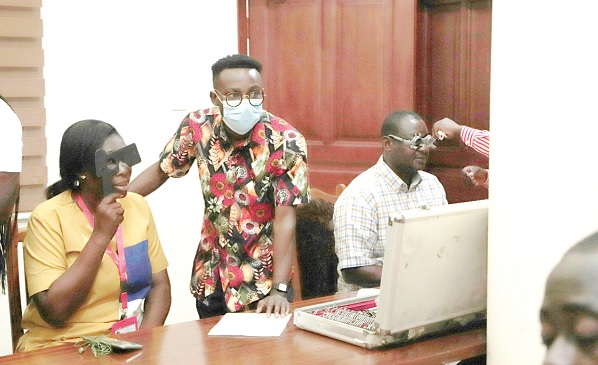Commemoration of World Sight Day: Include provision of eyeglasses in health insurance scheme — GHS
The Head of the Eye Care Unit of the GHS, Dr Hornametor Afake, also said that “the slightest vision impairment can reduce a person’s productivity by 10 per cent and accuracy by 22 per cent which could adversely impact the overall economy”.
The Ghana Health Service (GHS) has commemorated this year’s World Sight Day with a call for the inclusion of reading glasses in the National Health Insurance Scheme (NHIS).
“There are effective eye care interventions ranging from promotion, prevention, treatment to rehabilitation and it is our desire to see the inclusion of spectacles on the NHIS list, at least for children, and some cost-effective interventions such as cataract surgery to restore vision to those who are blind from cataracts,” it said.
It added that a healthy eye contributed to productivity and economic growth.
The Head of the Eye Care Unit of the GHS, Dr Hornametor Afake, also said that “the slightest vision impairment can reduce a person’s productivity by 10 per cent and accuracy by 22 per cent which could adversely impact the overall economy”.
He said that eyeglasses were cost-effective correction of refractive error, the leading cause of vision impairment and blindness in the country.
Dr Afake was speaking at a press conference held at the Graphic Communications Group Ltd (GCGL) in Accra yesterday.
World Sight Day is observed annually on the second Thursday of October as a global event to draw attention to blindness and vision impairment.
This year’s celebration is on the theme: “Love your eyes at work.”
The focus is on helping people to understand the importance of protecting their vision at the workplace.
As part of the activities to mark the day, the GHS, in collaboration with eye care partners, Vision Spring, carried out a free eye screening exercise for workers and employees of the GCGL and other selected institutions across the country.
Situation
Dr Afake mentioned that globally, at least 2.2 billion people had a near or distance vision impairment with almost half of those cases being preventable or yet to be addressed due to the lack of access.
He said that approximately, 230,000 people, about 0.74 per cent of the population in the country were blind.
Out of that, 127,000 were as a result of cataract, 44,500 (19.4 per cent) glaucoma, 30,000 (12.9 per cent) posterior segment, and 26,000 (11.2 per cent) cornea opacity.
Dr Afake said that although glaucoma was the second major cause of blindness and irreversible blindness in the country, its medication was costly and only few were covered by the NHIS.
Advice
Dr Afake advised employers to prioritise eye care of their workers because evidence showed a positive correlation between a healthy eye and productivity.
“Vision impairment poses an enormous global financial burden.
Unaddressed poor vision globally results in $411 billion in lost productivity each year,” he added.
Dr Afake also said that “children with vision impairment are up to five times less likely to be in formal education, and they also often achieve poorer outcomes”.
Farmers
The Vice-President of VisionSpring in charge of global programmes, Anne Coolen, said her outfit was also supporting cocoa farmers because they engaged in hand pollination which required clear near vision.
She said farmers were very crucial to the national economy and, therefore, including provision of eyeglasses under the NHIS would go a long way to increase productivity.
“So, this year alone, we are screening 60,000 farmers in the Ashanti Region and make sure they have access to cheap, affordable pair of glasses,” Ms Coolen added.
Source: Graphiconline


